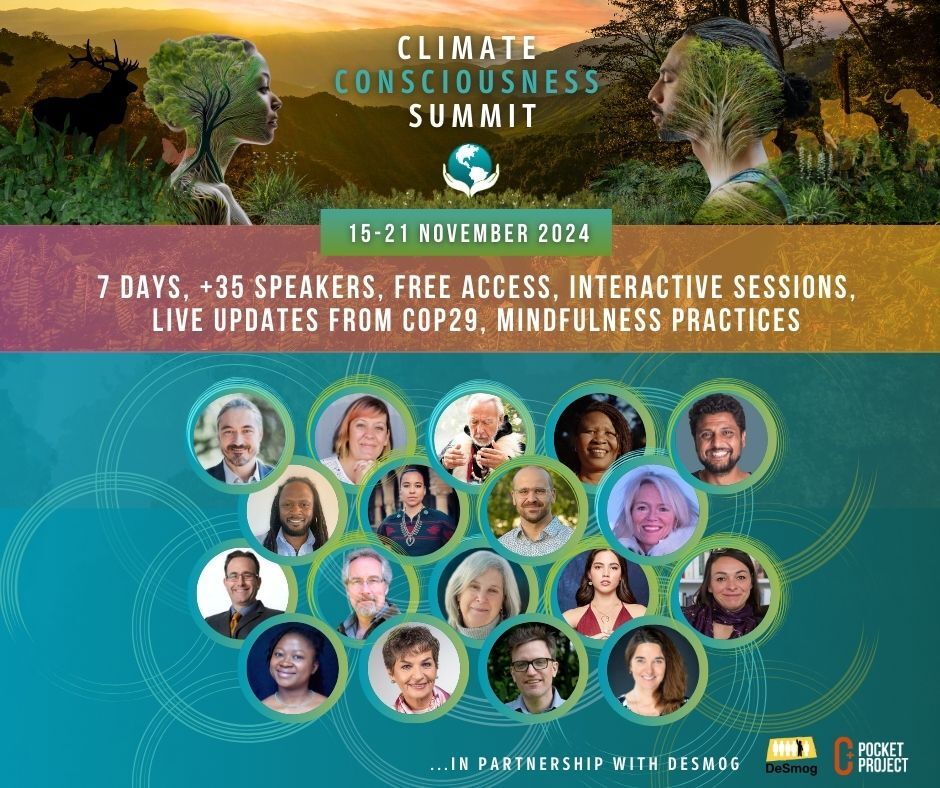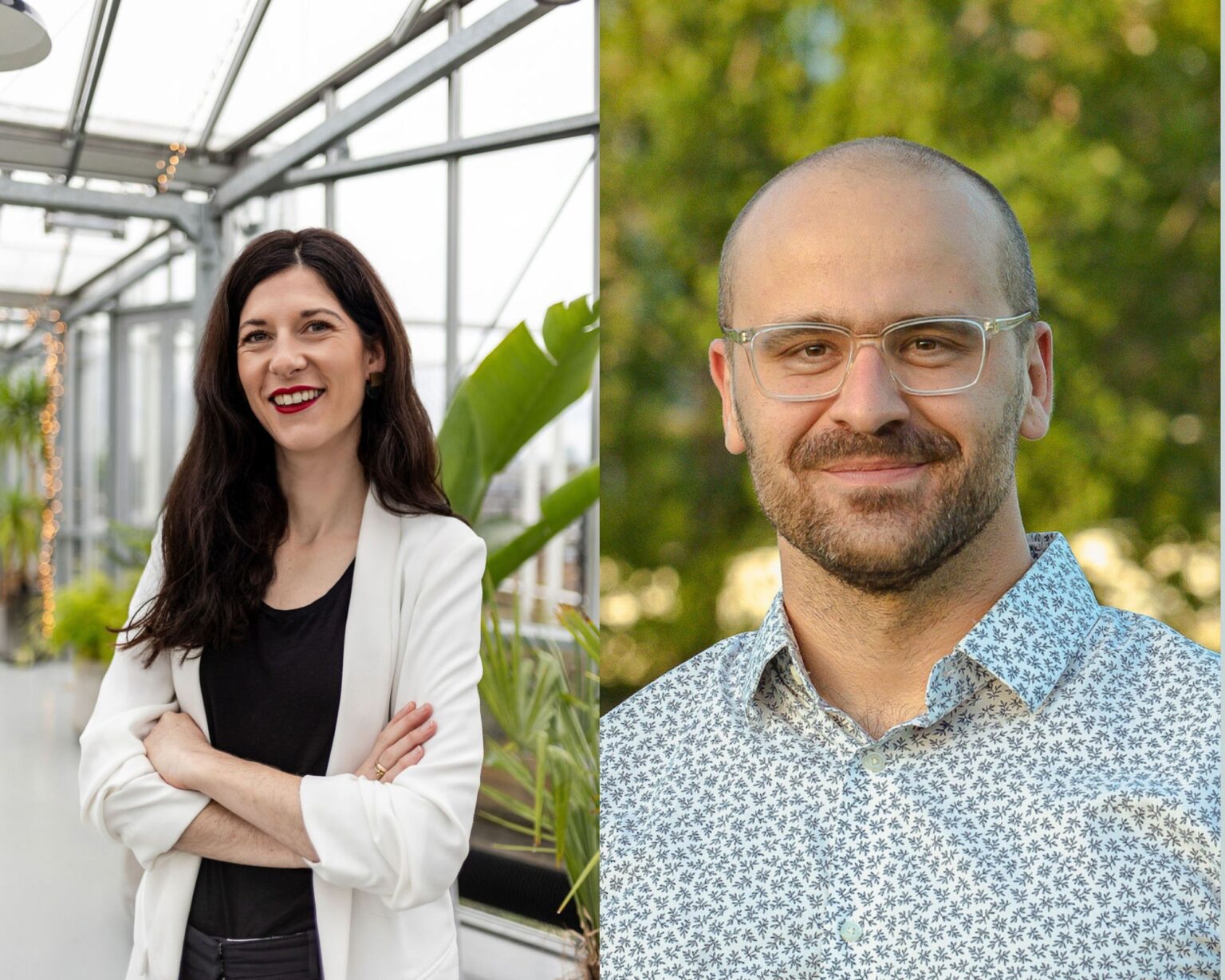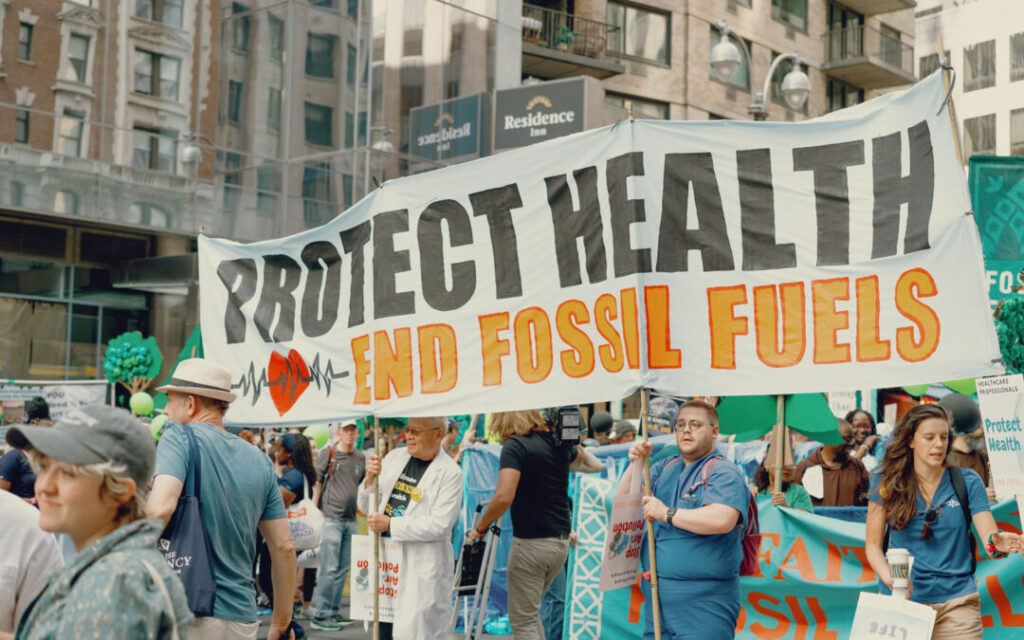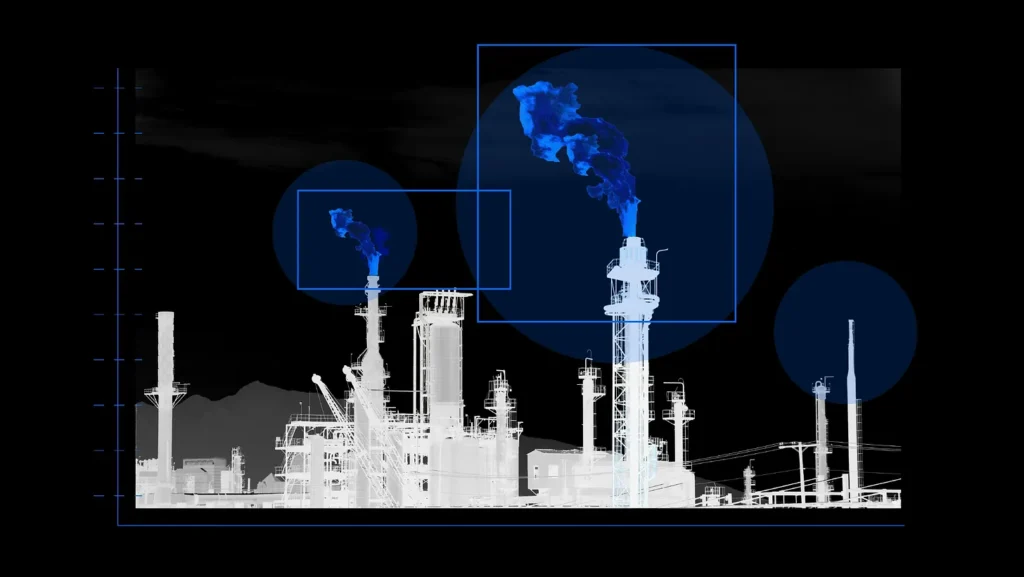In an interview for the Climate Consciousness Summit 2024, staged by the Pocket Project in partnership with DeSmog, I spoke with Lucy von Sturmer, founder of Creatives for Climate, and Duncan Meisel, executive director of Clean Creatives, about their work to transform the communications industry from a frequent mouthpiece of the fossil fuel industry into a champion of credible and equitable climate solutions.
Over the past few years, DeSmog reporters and researchers have been documenting mismatches between climate pledges by the “Big Six” advertising and public relations holding companies — WPP, Omnicom, Interpublic Group (IPG), Publicis, Dentsu, and Havas — and work by their subsidiaries to promote fossil fuel giants ramping up production of oil and gas.
In our video interview, which will go live during the November 15-21 Climate Consciousness Summit 2024, we discussed the importance of building community to support creatives advocating for change from within the industry; the kinds of tactics that might prompt C-Suite leaders to re-evaluate fossil contracts; and the philosophies that sustain climate advocates despite the daunting scale of the challenges.
In the run-up to the summit, DeSmog will be publishing Q&A interviews with other guests including Tzeporah Berman, chair of the Fossil Fuel Non-Proliferation Treaty Initiative; Immad Ahmed, founder of Empower the Future; Melinda Janki, a lawyer fighting to stop ExxonMobil drilling for oil off Guyana; and Lindsey Gulden, a former climate and data scientist at ExxonMobil turned climate whistleblower.
Register for the summit for free here.

Matthew Green: There’s growing awareness now of the pivotal role that advertising, public relations and creative agencies play in delaying climate action by helping to portray the world’s worst polluters as climate saviours. So Lucy and Duncan, both of your organizations are trying to tackle this problem in slightly different but complementary ways. Lucy, why did you set up Creatives for Climate?
Lucy von Sturmer: I love my craft, I’m very passionate about being a creative and being a persuader. And I felt really guilty about my skill set, and I was looking for ways to apply it to causes that I believed in. I worked for B corps. I worked for sustainability initiatives, in a way I was already working in a “clean” space. But I saw a gap in 2019 for collective action within this industry, and I wanted to challenge myself as a practitioner to explore what it would look like if I was truly collaborating with competitors and peers. And what does it mean to bring a citizen mindset to this movement?
For a brief moment in time, I explored direct action. So I went and participated in protests. And I also realized that that movement that I had joined wasn’t speaking to the industry that I was in. So in 2019 we launched the first Creatives for Climate event. We mobilized and we targeted top industry leaders to come and hear about the climate crisis, to emotionally engage with it. The first few years of Creatives for Climate were spent learning and exploring authentically what could this industry do?
And of course, one of the first calls to action that we realized had to happen was divesting from fossil fuels. So we actually had Femke Sleegers, who runs Reclame Fossielvrij here in the Netherlands, who was actually pushing for a fossil ad ban here in Amsterdam, speak at the first summit. And our community mobilized to support that ban.
Matthew Green: I’m hearing that there is that appetite within this creative community to use their skills for good, but conscious as well of how much of the time it’s big industries that are buying in this talent to present themselves as gatekeepers to climate solutions. Duncan, tell us about Clean Creatives.
Duncan Meisel: So we’re working at Clean Creatives off the assumption that if you’re a creative, if you’re a communicator, your values are not particularly aligned with the values of the fossil fuel industry. And the reason for that is that effective communication and creativity involves empathy. You have to reach across that all-too-human divide and try to put yourself in the shoes of someone else and reach them and build a connection between them, using communication. And that attitude of empathy and connection is in direct opposition to the strategies of the fossil fuel industry, which are driven by greed, self-interest, and extraction. And there’s just a basic gap between what these companies are trying to do to the world, and the values that are required to be effective at your job in a creative industry.
So we started in 2020, simply because I found out that the agency that was making ads for the American Petroleum Institute was based in my hometown of Austin, Texas, which is a very progressive place, with lots of very sharp and empathetic and forward-thinking creative minds. And I didn’t know anyone at the agency, but I knew that if they lived in Austin, and they were in the creative industry, that they were not down with this. And I figured that was also true in New York, where I used to live, and then also LA, and Amsterdam, and London, and all the places that the industry works.
There are people who are trying to create change, and then being asked to go to the office and do work on behalf of the companies that are trying to destroy the one planet we all live on. So that’s the core thesis of what we’re trying to do: have people speak out about their values, about the ways this isn’t aligned with building a functional workplace or a sustainable business. Not just sustainable in the sense of the planet, but if you want a young person to come into your office and make cool videos, they’re not going to do it If they’re being asked to work for the companies they know have been destroying their future. So it’s multifaceted. But I think that’s the core of it: communication means connection, and the fossil fuel industry is doing the opposite of that.
Matthew Green: More than a thousand agencies have now signed the Clean Creatives pledge?
Duncan Meisel: You can sign a pledge that says you won’t work with fossil fuel polluters, which we define as any company that puts more than 50 percent of their capital, or makes 50 percent of their revenue, out of fossil fuels, or agents or front groups that support those companies. And we have over 1,200 agencies that have taken our pledge, and over 2,000 individuals. And it’s a really vibrant and lovely community that has kind of Venn diagram connections with the community that Lucy is building.
Matthew Green: I wonder how important it is that you can provide a community for people who feel that maybe their livelihood depends on working in these large agencies where they may still have very little control over the clients that their bosses require them to represent?
Lucy von Sturmer: We all know the power of community in our personal lives, so I think that translates to industry, especially when you’re trying to stand up for change. Community translates to courage, translates to capacity, translates to action, and the normalization of certain ideas.
We started as a community out of a pure desire to find each other, to hang out with each other. And then we built core community values that also underpin what it means to be a part of the Creatives for Climate community. No single person, agency or organization can do it alone. But actually this industry, and mindsets within this industry, are geared towards competition. And so if we take seriously how little time we have to decarbonize, we can’t have practitioners coming up with effective methodologies and strategies, and not being willing to share that. So what are the collaboration forums that enable more radical sharing of best practice and case studies?
Another commitment that we have is asking people to commit to solutions through storytelling, really thinking about effectiveness in creative climate communications. There’s also a recognition around intersectionality: This isn’t just about net zero carbon emissions. It’s also conversations around social justice. The last barrier to entry is: “We believe that creativity for good can only exist alongside a commitment to divest [from fossil fuels]. So we’re really focused on creating pathways that point towards that new economy.
Matthew Green: I’m curious, Duncan, how far are we seeing this kind of upwards pressure from the grassroots of the industry starting to translate into shifts in the C-suite?
Duncan Meisel: There are definitely changes. Very big agencies have ostensible policies around fossil fuel clients that are now supposed to provide guardrails for the kinds of work they do. They’re not particularly well enforced. They’re not particularly clear, and our theory is that something like the Clean Creatives pledge has a level of clarity and specificity that is useful. But we know people are thinking about this: It’s a question that comes up for the CEOs of the biggest agencies on earth. They have to answer this question.
I think they have stepped away from the more frivolous sustainability projects with the recognition that they’re not particularly credible as long as they have this big problem with fossil fuels. And we want people to talk about this problem. We want people to step forward, but we want them to do it in a way that’s authentic and committed to real solutions. And so I think that is a sign of progress that people are having to evaluate whether or not they’re doing the thing that’s adequate in the eyes of the industry and their peers. What we’re trying to do is to make this inevitable — not by being super nice to them all the time; we’re going to point out the ways in which they’re falling short. But that’s really our vision here: we align the interests [of staff, of clients, of agencies] for action, and I think we are moving in the right direction in that regard, at least.
Matthew Green: I remember as a climate journalist the big story from last year, when Havas, which is a big Paris-based communications giant, took on a contract to represent Shell, and the CEO Yannick Bolloré had been very vocal on climate change. There was a big furore in the industry: It seemed to mark something of a watershed moment. Did that give you some hope, Lucy, that things are starting to shift?
Lucy von Sturmer: Yeah, I think we need these moments of clarity within the industry. And I think a watershed moment is accurate.
Matthew Green: We’re seeing horrific impacts from supercharged hurricanes on top of droughts, heatwaves, terrible floods. And we’re speaking obviously, before the outcome of the U.S. election. So how do you and your colleagues sustain yourselves to keep this fight going?
Duncan Meisel: Once upon a time I was on a bus, I worked at 350.org for a long time. I was on a bus with Bill McKibben, who founded it and wrote one of the first popular books about climate change in 1989. And I was like, “Bill, how do you keep going? How do you keep doing it?” And he was typing away, as he often is, and he looked up from his computer. He looked at me and just says: “What are you gonna do? Give up?”
And I said, “Well. No, I guess I’m not.” And I just think that’s the answer. We’re in a situation that’s unbelievably urgent. It’s unbelievably clear what the solutions are, and what the problems are, and I think you have to know in your heart that you’re on the right path. I’ve had other conversations with friends about this in the U.S. Because of the ongoing rightward shift and sort of radicalization of a lot of politics in the U.S. How do you know it’s working? What’s the point in keeping going? And you don’t. You never know. There’s no clarity about that. But you know the moment is never clear when things become truly transformative. And you do what you know is right, and you do it as well as you can. And eventually it will find its moment. And it’s not because you chose the exact right strategy, or every single time, but because you stay committed to the principles and purpose that you hold, and it catches fire when it catches fire. And you do the thing that you know is right, because eventually it will find its home, and it will find its voice.
Matthew Green: Lucy, what is the kind of emotional journey that you find people who are waking up to the severity of the climate crisis are going on?
Lucy von Sturmer: When I woke up to the reality of the climate crisis, it was such a process of grief. And I guess that’s in some way, shape or form the journey, if you’re going to emotionally engage with what’s going on. This is tough news, and I have a three-year-old. I’m loving raising a human, and I dread the day that, “what we’re setting you up to have an expectation for in your life may or may not be valid.” This kind of haunts me daily. One of the things that was really valuable for me was finding community and being able to emotionally engage with people around this. So at minimum we’re providing a space for people to do that.
Matthew Green: I wonder, Duncan, if we could explore a little further how do you essentially demand an end to the greenwashing or the protection of bad actors without replicating the kind of system that you’re trying to transform? Do you use naming and shaming as a tactic? Or do you find some other way that you can engage to offer a pathway to people in positions of influence to take a different route?
Duncan Meisel: Well, the dynamic we’re trying to transform is working with the fossil fuel industry. I think we’re just really specific about the problem we’re trying to solve: The energy system is responsible for 75 percent of global carbon emissions. That’s the problem we’re trying to fix. And there are great solutions for that system, like clean energy, and renewable technology is a miracle in some ways. We don’t have to dig this stuff up, transport it, refine it transport it back, set it on fire. The whole energy system we have is just — when you take a step back — it’s kind of nuts. It’s like weird, exploitative elements to each part of it.
I live in Texas. And I could tell you from well to pipeline, to refinery, to fuel tank, there are terrifying environmental justice consequences. There’s a lack of oversight for the environmental harm that’s done by this industry. That is what we’re ultimately trying to solve in my mind. I don’t think we need to assume that there’s going to be a global values transformation on the timeline. But there can be a change in the physical infrastructure we have, which does embody values. And I think if we do that, we’ll find that we have healthier communities, people with less poison in their lungs, and in their backyards, and in the waterways. And I think from there we have a platform to build a lot more powerful change and stability into our social system.
Matthew Green: We talked a bit about some of the evolution that you’ve seen in the industry and the progress you’ve made with the commitments to stop working with fossil fuel clients. What are the other signs that encourage you?
Lucy von Sturmer: What excites me is that there’s an opportunity for creatives to actually be solution-holders. In this industry typically people don’t oftentimes feel super confident with science or technical jargon or legal jargon. So we created an anti-greenwash guide for agency leaders which basically translated legal jargon into something that agencies could understand and feel empowered about. There’s such an appetite for speaking to this industry in a language that makes sense for how people think and act. That’s giving us a lot of energy and enthusiasm that the industry is going in the right direction. It’s really exciting for Creatives for Climate to be operating in an ecosystem with others where we are aligning on bigger goals, and collective wins.
Duncan Meisel: Well, the biggest trend that I think is most exciting is that here’s a whole host of people and organizations and networks that have stepped forward to be part of this huge spider web of people who are concerned and active and focused on specific interventions that can change the way that this industry works. I’m always super inspired by the people who sit in their jobs and every day are like, “I think this should be different” and are willing to sit it out and be patient, and listen to their coworkers and to their bosses, and figure out the pathways forward. I mean, I think people who are in these bigger companies and raise the issue in ways that they can find are incredibly inspiring. It’s a very thankless job to be at a big company and asking it to change. But we have a saying at Clean Creatives, which is “more is more”. Anytime you’re able to bring this up, in whatever way that you can, is productive, is useful.
Something that I think about a lot is the people pushing this ahead bit by bit, boulder by boulder, and making a change. That’s the big, difficult work in some ways. I think the fact that people are trying, all of this is a very positive sign.
Matthew Green: Any words of advice for anyone who’s in the creative world, and wondering what is theirs to do at this time?
Duncan Meisel: The first is that you’re not alone. If you have this concern, or you have a question, I guarantee there’s someone else wondering, or that question is at the tip of their tongue as well. And so you’re doing a service to yourself and your coworkers by raising the concerns you have. You know it’s valuable to everybody when you speak up. We’ve never had a situation where someone’s brought this up at an agency and really found that they’re the only person who’s thinking it. There is always someone else who’s on the same page on some level. So you’re not alone. Always always. Raise your voice where you can.
Every time you bring it up, there’s a little bit of progress made. There’s someone else who feels more confident speaking up. There’s a second thought that goes into the next proposal. There’s a reflection that someone has a chance to do, and that’s what progress looks like. Don’t be afraid of your voice. Because it will make a difference.”
Register for the Climate Consciousness Summit 2024 here.
This interview has been lightly edited for clarity.
Subscribe to our newsletter
Stay up to date with DeSmog news and alerts







